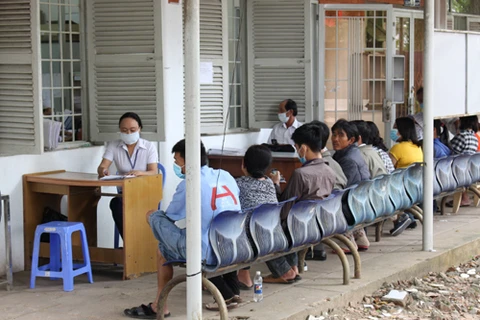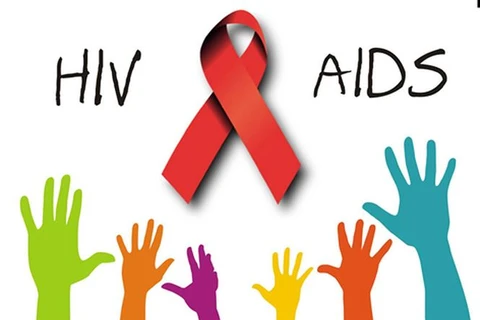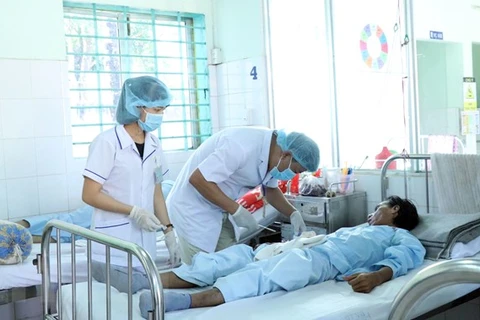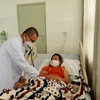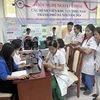Hanoi (VNA) – With 30 years of experience in dealing with HIV/AIDS, together with the country’s numerous international-recognised initiatives and achievements in the field, Vietnam is striving to put an end to AIDS by 2030.
Associate Professor Nguyen Hoang Long, Director General of the Vietnam Administration for HIV/AIDS Control, talks to a VietnamPlus reporter about the country’s fight against HIV/AIDS in the past three decades and its policies to eliminate the disease.
Reporter: What do you think about Vietnam’s efforts to curb the spread of HIV/AIDS?
Associate Professor Nguyen Hoang Long: Over the past 10 years, Vietnam has achieved three objectives: reducing new HIV cases, reducing the transition from HIV to AIDS, and reducing fatalities from the virus.
According to experts, Vietnam has helped more than half a million people with HIV and saved the lives of almost 200,000 people with AIDS. All these achievements should be attributed to the implementation of the National Strategy for HIV-AIDS Prevention.
Reporter: Can you tell us about the new national strategy to put an end to AIDS by 2030 recently approved by Prime Minister Nguyen Xuan Phuc?
Associate Professor Nguyen Hoang Long: The new strategy aims to put the Party’s guidelines into action to deal with the new situation.
The Party Central Committee’s Resolution 20 dated October 25, 2017, has set a target of basically eradicating AIDS in Vietnam by 2030.
To achieve this goal, each year we have to reduce the number of cases by at least 1,000 people.
Reporter: What can the health sector do to achieve this target?
Associate Professor Nguyen Hoang Long: The first thing we have to do is revise our measures on HIV/AIDS prevention to make them suitable for the new situation, particularly the task of preventing HIV/AIDS transmission through unsafe sex, especially among gay and transgender people. In addition, we have to apply advanced technology in the fight against HIV/AIDS, including preventive measures, tests, treatment and HIV/AIDS surveillance activities.
The approval of the National Strategy on HIV/AIDS Prevention shows Vietnam’s strong commitment in the fight against HIV/AIDS, alongside the international community, to put an end to the AIDS epidemic by 2030.
 Associate Professor Nguyen Hoang Long, Director General of the Vietnam Administration for HIV/AIDS Control (Photo: VNA)
Associate Professor Nguyen Hoang Long, Director General of the Vietnam Administration for HIV/AIDS Control (Photo: VNA) Reporter: Can you tell us some of the new points in the strategy?
Associate Professor Nguyen Hoang Long: The new strategy sets a clear target that by 2030, the AIDS epidemic will be wiped out. Of course, some of the contents of the new strategy are a continuity of the 2011-2020 strategy.
In the last few years, the HIV/AIDS epidemic has changed quite a lot, particularly among groups of people at high risk of HIV infection, especially men having sex with men (MSM).
Vietnam has set a target of eliminating AIDS by 2030. To achieve this target, with lessons learned from the 2011-2020 strategy, we have made certain adjustments while developing new measures to conform to the new situation.
Reporter: Can you share with us some of the challenges you will face making the new strategy a reality?
Associate Professor Nguyen Hoang Long: We have identified that raising public awareness in the fight against HIV/AIDS is the most challenging task. In many localities, people have not recognised the importance of HIV/AIDS prevention and control.
Specialists are concerned the epidemic could return, yet in many localities both local authorities and the public have not paid due attention to the issue, including financial investments to control HIV/AIDS.
The second challenge we are facing now is that there is no vaccine or specific drugs to treat HIV/AIDS, while the transmission route is mainly men having sex with men, women with women, and transgender sex.
It is estimated Vietnam now has some 40,000 people unknowingly living with AIDS. This poses a big problem for the community.
Last but not least is the lack of funding for the fight against HIV/AIDS. Over the past 30 years, Vietnam has received a lot of financial support from international organisations. However, in the near future, this financial support will be reduced considerably, so funding will depend mainly on the State and local budgets.
We hope that with 30 years of experience in the fight against HIV/AIDS and strong support from friends near and far, Vietnam will be able to overcome all the challenges and difficulties it faces implementing the national strategy to put an end to the AIDS epidemic by 2030./.

